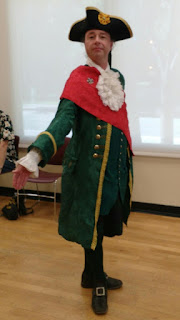 |
Answering the questions people have
asked (or I have asked myself) about
my past, present, or future. |
I haven't since childhood. I really don't have the time to care for a pet, and the pets I did have as kid probably suffered more than a little from my lack of attention, with school, computers and other things pulling at my interests.
My first pet was fish. I had an aquarium set up in my room with a couple of mollies (who didn't live long), zebra fish, platties and a pink kisser fish. That kisser was my favorite. It swam up and down along a corner of the tank, making that kissing motion with its mouth. The other fish, a lot smaller and a lot less aggressive, didn't mess with the kisser. The pink bully used to sleep at night on top of a ceramic bucket we put in the tank, the tropical fish equivalent of Snoopy. The Queen Mother let me feed the fish, but I was too young to change the water, so she did that about once a week. You don't realize how dirty fish can get until you clean an aquarium.
After many years of begging, we got our first family dog. Cinnamon was a Brittany Spaniel, back when they were officially considered spaniels. Cinnamon came from a family in Kansas, the product of a backyard litter. We learned that she was quite the jumper, and it took two baby gates stacked on top of each other to keep her from coming upstairs from the playroom, now officially our dog room.
"Donation to the puppy farm!" Grandma Lawson greeted us one day, a stack of newspapers in her hand. "You know, this place is really starting to smell like dog!"
Fortunately, we had a sizable backyard with a five-foot fence on three sides. The neighbor's chain-link fence lined the fourth, where Cinnamon would run and bark at the neighbor's German Shepard, Champ. Cinnamon wore out all the grass along our side of the fence, turning into a muddy pulp. We tried laying sod down, but Cinn quickly wore that out. We had no choice but to put in red concrete tiles.
Cinnamon found creative ways to annoy the Queen Mother, including sleeping in her marigolds and sitting in one of the planters we used for whatever else she was trying to grow. The barking got on her nerves. Digging under the fence got on her nerves. The dog would carry around hedge apples in her mouth, and it's a wonder she didn't get sick from them. But again, dogs develop cast iron stomachs.
I used to take Cinnamon for walks -- or rather, she would walk me. We had Cinn on a "choke chain" to discourage her from pulling the leash too hard, but she did it anyway. That dog dragged me all over the neighborhood, stopping at every other driveway to chew on grass clippings or something else she would find in the dirt that would make a dozen people sick. I managed to train Cinnamon to sit, but I had a hard time disciplining her. She had those sad brown eyes that made me cry.
The Queen Mother used to complain that I wasn't spending enough time playing with the dog. Or feeding her. Or anything else with her. And Mom was left picking up the slack, just like with the fish. Again, other things tugged for my attention. After Cinn left us, the Royal Father got a Springer Spaniel, and again Mom was left with part of the duties for a dog she really didn't want. She won't let him have another one.
And I've put the same restriction on myself. Too many things are still competing for my attention. Somebody suggested I get a cat, but people who own cats will tell you felines expect the world, which they believe revolves around them. I'm just trying to deal with my own world right now.











